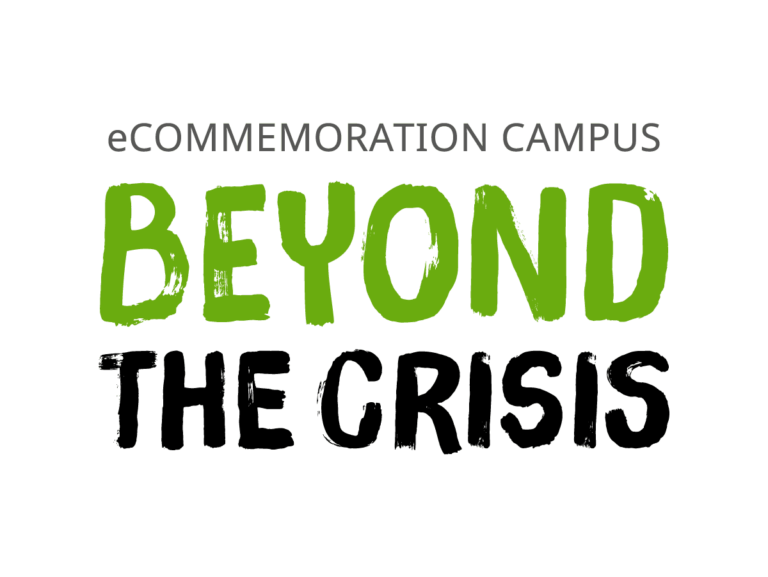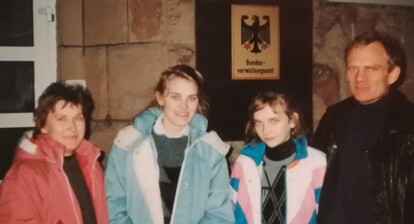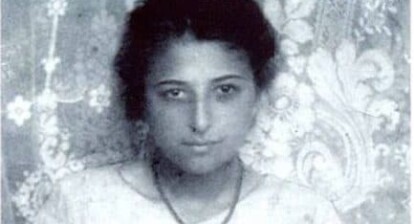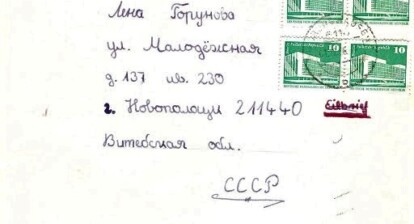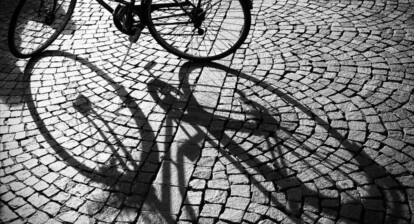Wild nineties
in russia
in russia
From a Woman's Perspective
By Liza, participant of the eCommemoration Campus 2020
"If I had to describe the 90s in three words, I would say: hard, chaos, scary."

"There is an entrance and an exit for every problem," says Ekaterina. The photo was taken in the 1990s – photograph: private
This is Ekaterina.
She is a Russian woman who was in her 40s when she experienced the "wild" nineties in Saint-Petersburg.
Here, she shares her story and her way of dealing with crisis during those years.
She is a Russian woman who was in her 40s when she experienced the "wild" nineties in Saint-Petersburg.
Here, she shares her story and her way of dealing with crisis during those years.
1
"We didn't get wages anymore"
The Economic Situation in Russia in the 1990s
“
I felt the impact of the crisis of the 90s right at the beginning.The factories began to slip a little. My husband and I worked at a shipbuilding plant and in the 90s we suddenly didn't get wages anymore. There was practically nothing to live on. We went to work, but there was no money. Then there were cuts and I was hit by the reduction.
The nineties in Russia were characterized by a deep economic crisis. After the collapse of communism and the dissolution of the USSR in 1991, Russia began a completely new economic policy, moving from a command economy - a system based on total nationalization of property - to a market economy.
"There was a card system"

Cards for soap, tea and washing powder / photo: private
The uncertainty of economic prospects, discussions about the upcoming monetary reform and higher retail prices pushed the Russian population to buy up goods and create stocks of essential items. As a result, the few goods left from the 80s disappeared from the stores. Introducing the principle of distribution of goods among the population by providing cards and coupons could not improve the situation. "Hungry queues" became normality and a major political issue, contributing to the strengthening of the confrontation between political forces.
Ekaterina remembers the card system very well. 'Some goods you couldn't buy for money, you only got them in exchange for cards. But to get these products, which were already scarce, you had to stand in line which could last for hours', she says.
"Money was only for food"
As it's mentioned in the book "The history of Russia from the ancient times to the present day" five-fold increase in prices predicted by the reformers in fact turned into a 100-fold or more rise in prices. As a consequence, the majority of the country's population ended up below the poverty line.
The huge rise in prices caused by market-liberalization almost completely destroyed the population's money accumulations, which had been stored in state savings banks. Savings the people had put aside for years or even decades were liquidated at once. According to experts, we are talking about one trillion pre-reform rubles.
The huge rise in prices caused by market-liberalization almost completely destroyed the population's money accumulations, which had been stored in state savings banks. Savings the people had put aside for years or even decades were liquidated at once. According to experts, we are talking about one trillion pre-reform rubles.
“
To tell the truth, money was only for food. We borrowed money from pensioners. Pensions were small, but they were paid regularly. We must at least give the state credit for that.

Market in Russia in 1992 – photograph: Brian Kelley
The introduction of a free market economy contained a set of measures widely common in world practice: first, the release of prices, followed by the allowance for free trade, the next step was privatization as the transfer of state property to private hands. Free prices were supposed, according to the plan of the reformers, to determine the real price of goods and to activate the mechanism of competition, in short: to make people "make money".
Privatization, by making people owners, was designed to create powerful incentives to work. But one result of this program was the rise of the 'Red Jackets', Ekaterina explains.
Privatization, by making people owners, was designed to create powerful incentives to work. But one result of this program was the rise of the 'Red Jackets', Ekaterina explains.
2
Why Were The 90s "Wild"?
Lawlessness
“
If I had to describe the 90s in three words, I would say: hard, chaos, scary. The redistribution of property was problematic. It was about murders, scandals and fights. A car that was parked in the yard was burned under the windows of a neighboring house. But as we were not in business, there was no need to rob us or set something on fire. Nevertheless, it was really scary to walk down the street because it was possible to be drawn into the showdown of criminals.
The most important consequence of the ongoing economic liberalization was a sharp increase of the gap concerning the level of income and consumption. A wave of layoffs set in, especially in the enterprises of the military-industrial complex. A whole class of people working in the production sector was unemployed overnight, like Ekaterina.
Finding Legal Loopholes
These people began to look for alternatives to earn their living, not in a criminal way, but by using the legal loopholes. Trade had become an area where some people were able to find their social niche. Simplification of travel abroad contributed to the emergence of so-called "shuttle traders" - people making short trips abroad to purchase goods and then sell them on the markets.
During the years of reforms, the socio-economic position of social groups, their activity and state of consciousness changed simultaneously. The formation of new population strata set in, the erosion of old ones began. As restrictions on entrepreneurial activity were lifted, new groups with clearly defined interests appeared.
In the post-communist transformation process, the richest owners soon became a new, higher property class. By the end of 1998, a new social structure had established in Russia, shaped by distinctly different income levels: oligarchic, regional and corporate elites - the so-called "upper class"-, the middle class and outsiders.
In the post-communist transformation process, the richest owners soon became a new, higher property class. By the end of 1998, a new social structure had established in Russia, shaped by distinctly different income levels: oligarchic, regional and corporate elites - the so-called "upper class"-, the middle class and outsiders.
“
Many people made a fortune for themselves, those who did not hesitate to deceive or rob someone.
Red Jackets And Gold Chains Around Their Neck
“
In the 90s there were the 'red jackets'. This is about people who had a criminal past, who quickly became rich, usually in a dubious or illegal way, and started their own business. And these people put on red jackets, gold and thick chains around their necks. It was immediately obvious when I met such a person in the 90s, that the 'owner of life' was coming.
These men, Ekaterina explains, were wealthy and powerful in the 1990s, they could handle nearly everything with their connections or money.
The Law on Enterprises and Entrepreneurship, adopted on December 25, 1990, allowed individual entrepreneurial activity and the creation of private businesses. A year earlier, the Union Law permitted the lease of state enterprises by labor collectives. In practice, this meant buying out state-owned enterprises at low prices.
This marked the beginning of the so-called nomenklatura privatization. Using the vagueness of the adopted laws, the directors' corps and all sorts of businessmen received full and uncontrolled possession of hundreds of thousands of state enterprises. In particular, the right to appoint themselves multimillion-dollar salaries and bonuses, to increase their incomes by legal means. By the end of 1991, there were 3,076 associations, 227 corporations and 123 consortia in Russia. Thus, before the start of market reforms, a significant part of the "public" property was distributed to the nomenclature.
The Law on Enterprises and Entrepreneurship, adopted on December 25, 1990, allowed individual entrepreneurial activity and the creation of private businesses. A year earlier, the Union Law permitted the lease of state enterprises by labor collectives. In practice, this meant buying out state-owned enterprises at low prices.
This marked the beginning of the so-called nomenklatura privatization. Using the vagueness of the adopted laws, the directors' corps and all sorts of businessmen received full and uncontrolled possession of hundreds of thousands of state enterprises. In particular, the right to appoint themselves multimillion-dollar salaries and bonuses, to increase their incomes by legal means. By the end of 1991, there were 3,076 associations, 227 corporations and 123 consortia in Russia. Thus, before the start of market reforms, a significant part of the "public" property was distributed to the nomenclature.
3
"I felt that I had to do something to survive"
Finding Solutions During Crisis
“
Many people worried that there was not enough money, but I, frankly speaking, did not. If you have enough money to survive, that's fine. I just felt that I had to do something to survive. When I went shopping, I calculated what I had enough money for.
I did not rush into panic, but I started looking for a way out. We had no money, so my husband went to work at another plant in a private company. We lived from his salary. When we didn't have money for normal food, we just ate what we could get for the money we had.
I did not rush into panic, but I started looking for a way out. We had no money, so my husband went to work at another plant in a private company. We lived from his salary. When we didn't have money for normal food, we just ate what we could get for the money we had.

Ekaterina and her husband in the 90s – photograph: private
During the first months of reforms, the standard of living of society was thrown back 10 to 20 years ago. By 1994, the real incomes of the population had halved. 32 million out of 148 million Russians found themselves below the poverty line. Their income did not exceed $ 40 per month.
The collapse of the Soviet socio-economic system and the emergence of a market economy in Russia led to a drastic change in the social conditions and the value orientations of people. Millions of Russian citizens were suddenly faced with problems which did not exist during the Soviet era. The impover-ished state was unable to bear the costs of free education, health care and other forms of social protection.
The collapse of the Soviet socio-economic system and the emergence of a market economy in Russia led to a drastic change in the social conditions and the value orientations of people. Millions of Russian citizens were suddenly faced with problems which did not exist during the Soviet era. The impover-ished state was unable to bear the costs of free education, health care and other forms of social protection.
“
I have never been angry with circumstances. Why to get mad at them if I can't change them. There is an entrance and an exit for every problem. Sometimes there are multiple entrances and multiple exits. If there is any problem, don't think too much about that this is a "problem" - see how you can solve it.
The historical background provided in this text is based on: "History of Russia from the ancient times to the present day" by Andrei Nikolaevich Sakharov, Aleksandr Nikolaevich Bokhanov, Vladimir Alekseevich Shestakov.

